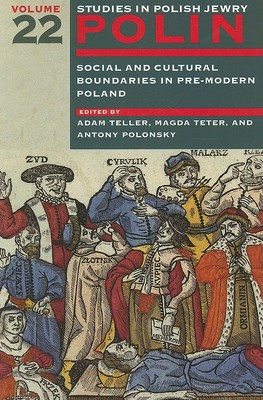
- We will send in 10–14 business days.
- Publisher: Littman Library of Jewish Civilization in Association with Liverpool University Press
- ISBN-10: 1904113370
- ISBN-13: 9781904113379
- Format: 15.5 x 23.1 x 4.1 cm, minkšti viršeliai
- Language: English
- SAVE -10% with code: EXTRA
Polin: Studies in Polish Jewry Volume 22 (e-book) (used book) | bookbook.eu
Reviews
Description
Boundaries-physical, political, social, religious, and cultural-were a key feature of life in medieval and early modern Poland, and this volume focuses on the ways in which these boundaries were respected, crossed, or otherwise negotiated. It throws new light on the contacts between Jews and Poles, including the vexed question of conversion and the tensions it aroused. The collected articles also discuss relations between the various elements of Jewish society-the wealthy and the poor, the educated and the uneducated, and the religious and the lay elites, considering too contacts between Jews in Poland and those in Germany and elsewhere. Classic studies by such eminent scholars as Meir Balaban, Jacob Goldberg, and Moshe Rosman provide a foil for new research by Hanna Zaremska and David Frick, as well as Adam Teller, Magda Teter, Elisheva Carlebach, Jurgen Heyde, and Adam Ka'zmierczyk. Taken together, the contributions on this central theme help redefine the Jewish history of
pre-modern Poland. As ever, the New Views section examines a wide variety of other topics.
EXTRA 10 % discount with code: EXTRA
The promotion ends in 22d.07:36:19
The discount code is valid when purchasing from 10 €. Discounts do not stack.
- Publisher: Littman Library of Jewish Civilization in Association with Liverpool University Press
- ISBN-10: 1904113370
- ISBN-13: 9781904113379
- Format: 15.5 x 23.1 x 4.1 cm, minkšti viršeliai
- Language: English English
Boundaries-physical, political, social, religious, and cultural-were a key feature of life in medieval and early modern Poland, and this volume focuses on the ways in which these boundaries were respected, crossed, or otherwise negotiated. It throws new light on the contacts between Jews and Poles, including the vexed question of conversion and the tensions it aroused. The collected articles also discuss relations between the various elements of Jewish society-the wealthy and the poor, the educated and the uneducated, and the religious and the lay elites, considering too contacts between Jews in Poland and those in Germany and elsewhere. Classic studies by such eminent scholars as Meir Balaban, Jacob Goldberg, and Moshe Rosman provide a foil for new research by Hanna Zaremska and David Frick, as well as Adam Teller, Magda Teter, Elisheva Carlebach, Jurgen Heyde, and Adam Ka'zmierczyk. Taken together, the contributions on this central theme help redefine the Jewish history of
pre-modern Poland. As ever, the New Views section examines a wide variety of other topics.


Reviews